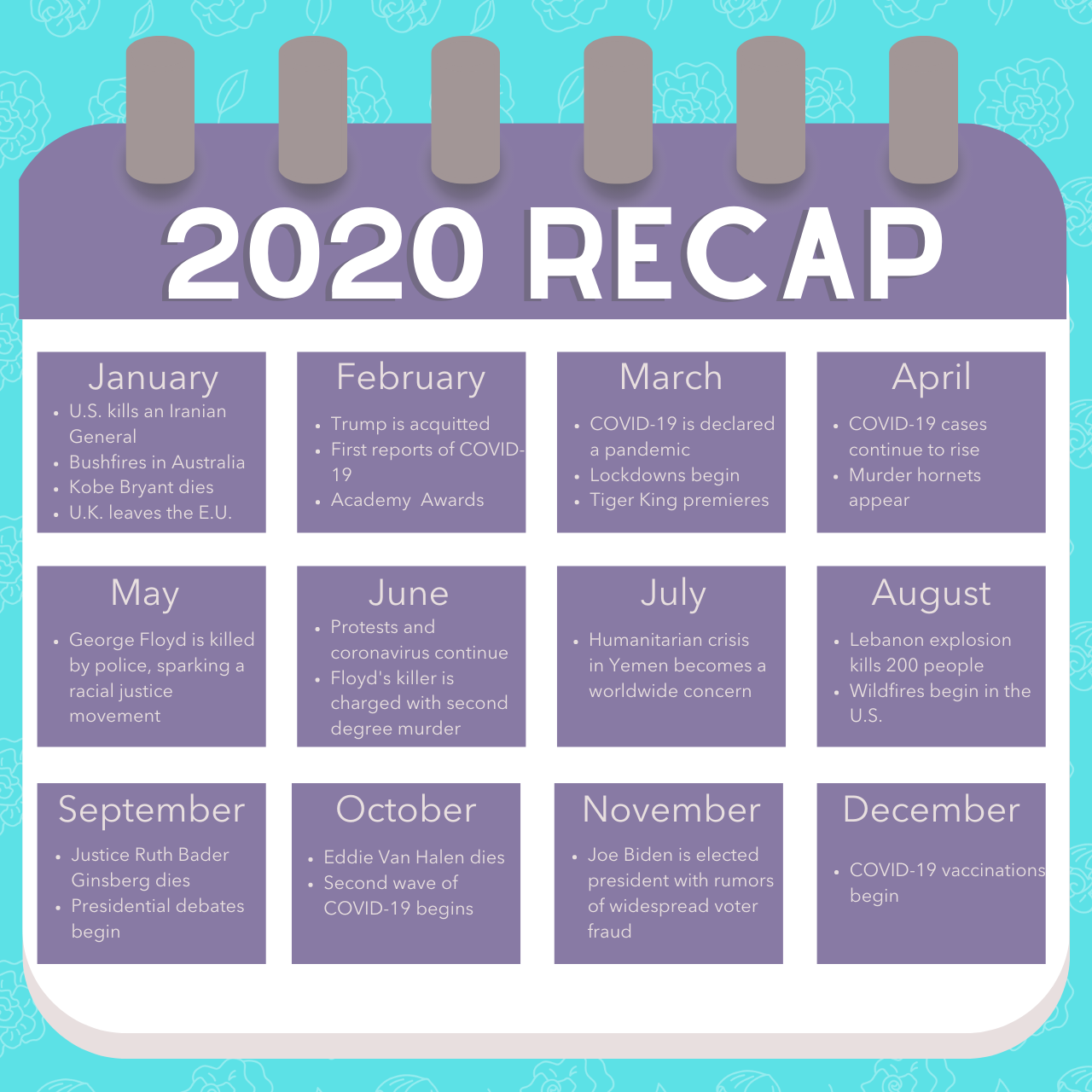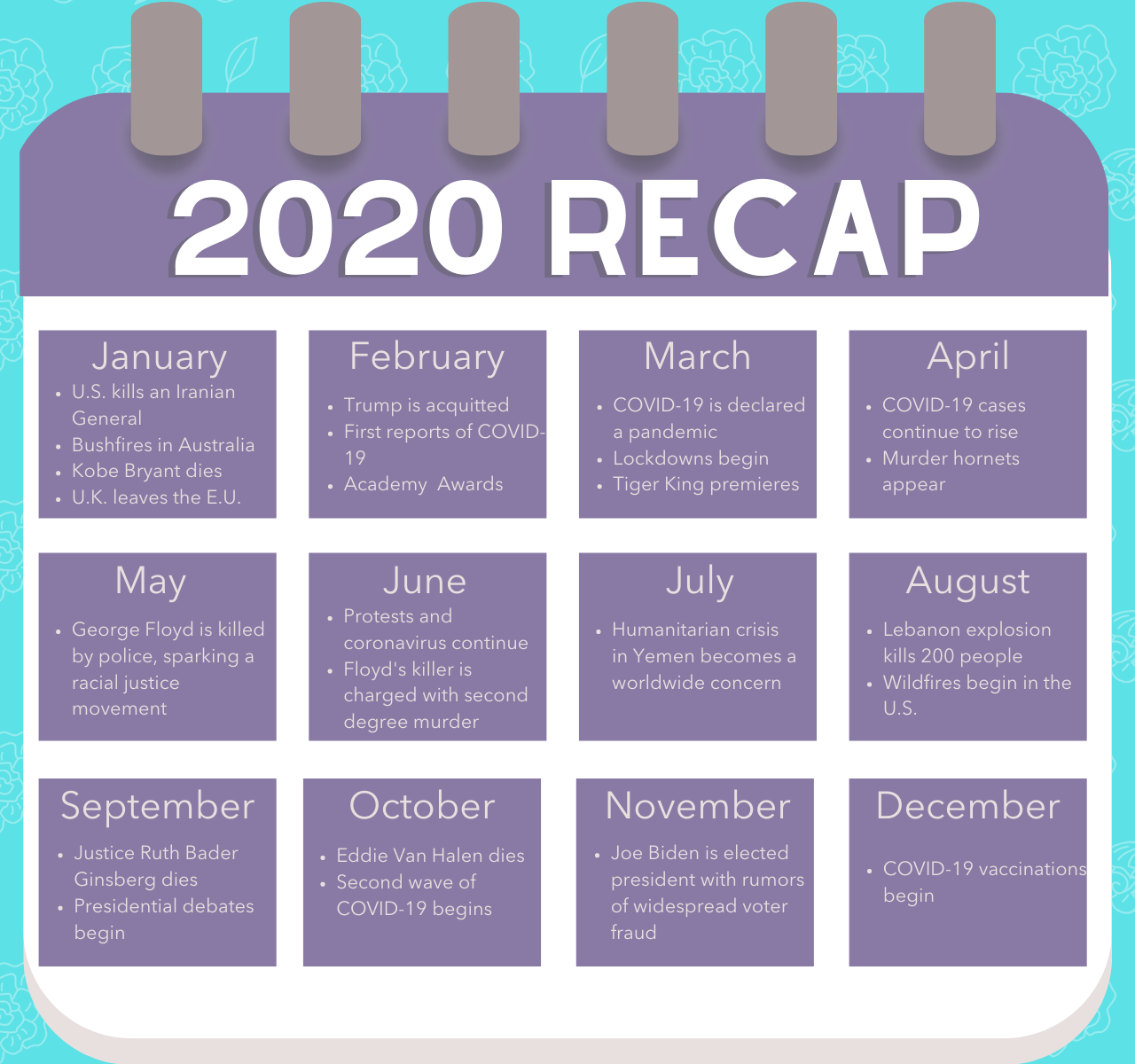
Oh, 2020. What a year you have been.
In my near 22 years of life, I have never experienced a year that simultaneously went as slowly and quickly as this one. It started fairly normal. March felt eternal. Now, it’s somehow December.
But what all happened this year? Every other day it felt like I was doing a double take.
To start off the year, a United States air strike killed Qasem Soleimani, an Iranian major general. The strike followed previous attacks between Iran and the U.S. as part of the 2019-2020 Persian Gulf crisis.
As it always does, social media got a hold on the assassination and escalating tension. Soon, World War 3 was trending on Twitter.
In Australia, massive bushfires broke out after record-breaking temperatures and months of severe drought. Authorities declared a national emergency, and over 11 million hectares of bush, forest and parks burned. Canberra, the country’s capital, even shut down its airport momentarily as the fires crept closer.
President Donald Trump was impeached by the House in mid-December, making him only the third U.S. president to be impeached, joining Andrew Johnson and Bill Clinton.
Then the Senate’s impeachment trial began Jan. 16 with Supreme Court chief justice John Roberts presiding over the trial. Trump was acquitted Feb. 5.
On Jan. 26, we woke to news of Kobe Bryant’s death from a helicopter crash. He was on his way to his daughter Gianna’s basketball tournament. She, along with seven others, also died in the crash.
The United Kingdom officially left the European Union on Jan. 31. Brexit has been a few years in the making and highly contested, but the decision is now complete. Some deals and negotiations are still in flux.
Going into February, global concerns arose regarding the novel coronavirus. Outbreaks started in China and cases rapidly began popping up around the world. The U.S. had 24 cases reported.
The Academy Awards made history this year. “Parasite” won Best Picture, becoming the first non-English language film to win the category. The film took home the most awards that night, totaling four with Best Picture and International Feature Film. Writer, director and producer Bong Joon Ho accepted the awards for Best Director and Writing (Original Screenplay).
Enter stage right: the longest month I have ever experienced. March 2020.
The coronavirus was spreading quickly. On March 11, the World Health Organization deemed COVID-19 a pandemic. Schools moved to online instruction on or around March 13, and after that, businesses, companies and various employers closed in-person activities. Other than essential services, everything was forced online.
The U.S. case total soared, reaching a total over 188,000. Hospitals were struggling to keep up with the influx of patients, and no one quite knew how to slow it down.
And thus, the start of lockdown living.
Remember Joe Exotic and “Tiger King” craze? That was this year.
Italy was Europe’s outbreak center, with cases emerging in February, and the country was the first to establish lockdown restrictions.
In April, COVID-19 cases hit 1 million worldwide. We were all learning how to live in a pandemic. It was weird and scary and uncertain, but we were in it together.
Just as it seemed we were reaching some stability—at least in our collective agreement to overcome the virus—May brought its own slew of events.
Asian giant hornets appeared in the U.S. and quickly were dubbed “murder hornets.” Their size and sharp mandibles allow them to take out rival hives in mere hours, and in Japan, the hornets kill up to 50 people per year. This was their first sighting in the U.S.
Late into the month, the U.S. unfortunately reached 100,000 COVID-19 deaths. Lockdown restrictions started to let up a bit, slowly reopening the public.
Then, on May 25, George Floyd was killed in downtown Minneapolis by a police officer. His murder sparked racial protests in the Twin Cities and across the country. The following week brought civil unrest, protests and riots. Statues of historical figures were knocked down. Cities established curfews, and COVID-19 was still a threat, especially with the gathering crowds.
The tension continued throughout the summer with cries for justice and equality.
The humanitarian crisis in Yemen reached new levels of emergency with the addition of COVID-19. 80% of the population are in need of humanitarian assistance, including more than 12 million children. Clean water, sanitation and stable food sources are nearly nonexistent for most of the population, which is compounded by COVID-19.
Wildfires blazed in the Pacific Northwest, carried by winds as high as 50 mph. The fires displaced people from their homes on account of evacuations, but many homes were entirely destroyed. Residents of Portland, Oregon had preliminary orders to be prepared to evacuate. The fires sparked remembrance of Australia’s struggle earlier in the year, which reissued the urgency of climate change.
In Lebanon, a catastrophic explosion rocked the capital city Beirut, killing about 200 people and injuring 5,000 on Aug. 4. The blast levelled buildings at the Port of Beirut, near where the explosion occurred, but the effects were felt throughout the city.
Multiple deaths once again shook the public: Chadwick Boseman on Aug. 28, Justice Ruth Bader Ginsburg on Sept. 28 and Eddie Van Halen on Oct. 6.
Moving into the upcoming school year, everyone was eager to regain some normalcy. The summer months were rife with anxiety and blight.
Everyone was tired.
Within the U.S. specifically, COVID-19 and racial tensions exhausted our mental and emotional efforts. Confirmed cases continued to climb (and still do).
Not to mention, the presidential election was on our heels.
Voters worried for their safety if they ventured to the poles, so mail-in ballots and the U.S. Postal Service had increased responsibility. The chaos of Amy Coney Barrett’s nomination for the Supreme Court just a month before the election clouded the political sphere. Clearly with the precarious state of…well, everything, it was an important vote. And it certainly was interesting.
Election day turned into election week, given the time needed to count the mail-in ballots. This both eased and added to the stress. The voting was done, but we had to wait. This singular week felt like three months by itself. The country was waiting on Nevada to declare a winner.
Radio silence, and then came the night of Nov. 5. It was pandemonium.
Pennsylvania and Georgia turned blue, propelling Joe Biden over the necessary 270 votes. The mail-in ballots that could not be counted prior to election day turned those states around.
Rumors emerged that Russian President Vladimir Putin was stepping down, causing a frenzy of speculation.
In the meantime, the CW show “Supernatural” finally saw a love declaration 12 years in the making. Castiel’s confession, and thus popular fan ship “destiel” becoming half-canon, single-handedly resurrected 2012 Tumblr. Twitter’s trending page was split between political bombshells and a gay angel’s love.
Waking up on Nov. 6 felt like discovering the remains after an all-too-wild party. Though, on Nov. 7, the U.S. had a new, albeit unconfirmed, president-elect.
Trump made claims of voter fraud, but those have since been discredited. A smooth transition between administrations is still questionable, but with the safe harbor deadline on Dec. 8, Biden is essentially secured to be the 46th president.
His administration will begin following an incredibly tough year for Americans and for the world.
The nightmare we call 2020 is almost over. But many of the problems we’ve faced will not disappear when the Times Square Ball drops.
So what do we make of 2020?
Sometimes it felt like salt in the wound or getting kicked after already being knocked down. In every regard, it was tough. It’s certainly not one I’ll think about fondly, or one I want to think about much at all.
But it couldn’t have been a total waste, right?
Greenhouse gas emissions were severely reduced with the lack of production and business. This shows that we can still make an impact on the climate.
Schools found a way to keep going despite the online restriction, and with that, parents and kids spent more time together.
Vaccine approvals around the world are bringing reprieve to health care workers and vulnerable populations. It could be the beginning of the pandemic’s end.
Taylor Swift dropped “folklore” out of nowhere. She really played into our sad quarantine emotions with that one, but I’m not mad about it. Then, she surprised us with “evermore,” another full album just five months later.
We have the Tokyo Olympics to look forward to!
No one wants a cheesy motivational phrase right now. We all know what this year held, and we all know it’s going to be an uphill climb toward normalcy.
But good remains, and good will come. We can make it through.
As my mom frequently reminds me, we take it one day at a time. And as my dad tells me, this too shall pass.
Maddie Peters can be reached at pete9542@stthomas.edu.



